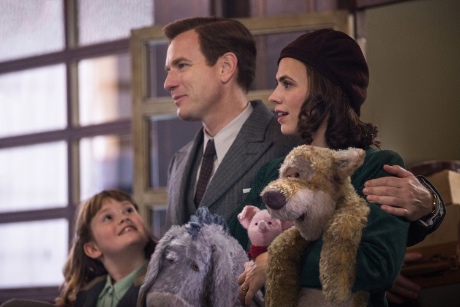I hadn’t thought about heffalumps for many, many years. But as Lucy and I walked tonight, I told her we were patrolling the neighborhood for heffalumps. I laughed as I explained to my dog about why the inhabitants of the Hundred-Acre Wood are so scared of these fierce imaginary creatures.
If anybody had heard my conversation with Lucy, he might have thought I’d gone mad. But I was just having joyful fun — and Lucy didn’t seem to mind.
I had meant to watch Disney’s “Christopher Robin” when it came out last summer, but I didn’t get around to it until Tuesday night. For me, the movie doesn’t get magical until Madeline — Christopher’s daughter — unexpectedly meets Pooh, Piglet, Eeyore and Tigger while they’re on the way to London to save Christopher’s job. Every moment from there on is wonderful. But nothing tops the last few minutes — when Christopher, his wife Evelyn, and Madeline join all the animals for an afternoon in the Hundred-Acre Wood.
It was at that point when I didn’t want to leave. I wanted to be part of this loving fantasy of family and whimsy. And it brought tears to my eyes.
This is not a movie review, because that would miss the point of what I want to say. In general, though, I think the first third of the movie is a bit slow and the script doesn’t do a very good job of handling Christopher’s reaction to seeing Pooh for the first time in years.
The animation is perfect and the re-creation of 1930s England is wonderful. You will believe that these stuffed animals have really come to life and are interacting with people and the world around them. The acting — especially from the three main human characters — is superb.
And those three humans — the family at the core of the movie — are who I really want to talk about. The amazing and loving talking animals are fun. This is a fantasy, after all. But this is really a movie about a family — and that’s what made me teary-eyed at the end.
Early in the movie, Evelyn and Madeline are very unhappy. Even though Christopher was a playful child, he’s grown up to become scared not to work all the time. He has put play behind him and lost himself through tough experiences: Boarding school. Losing his father early. Fighting in a world war. And working for a company that expects him to put work before his family all the time.
This is a theme you’ve seen before. You can spot where this is going, but to cynically say that is to miss the enjoyment of what it feels like at the end.
When grown-up Christopher returns to the Hundred-Acre Wood with Pooh, he is a very different man than the little boy they had known. He has lost himself over the years — and he’s about to lose his family.
Through his childhood friends, Christopher reconnects with the child he once was. Madeline and some of the characters from the woods set off to London at one point to save him. This is both a story point and a thematic direction.
I’m not giving away too much to say that everything works out well in the end. But what really struck me — the part that made me want those last few minutes to last forever — was the love and connection of the family and the animals in this magical place at the end.
There are times when every family has to live in “the real world.” We have to do things which we don’t always want to do in order to make a living. We can’t play all the time. But we can tell stuffy people that we’re off to do nothing with our families for awhile. We can make it clear what our priorities are. A husband and wife can love each other deeply. They can give their daughter the attention she’s been craving.
There are times when we all can leave the ugliness of life on the outside and escape to our own Hundred-Acre Wood. That will look different for every family. There’s no model that works for everyone. But if love and family are our priorities, our other responsibilities will fall into their proper place.
I didn’t want to leave the Hundred-Acre Wood when the movie was over. I just wanted to go find my wife and daughter and son — or whoever I’m blessed enough to be given to love — and find our Hundred-Acre Wood, where we can have love and connection with one another.
You might think I’m exaggerating when I say this, but I’m not. That kind of love and connection in a family can change the world — and it can save the lives and sanity of those who choose to find it together.

 Lives change in moments of truth when we stop lying to ourselves
Lives change in moments of truth when we stop lying to ourselves FRIDAY FUNNIES
FRIDAY FUNNIES Grow veggies in your own yard? ‘You’re heading to jail, you criminal’
Grow veggies in your own yard? ‘You’re heading to jail, you criminal’